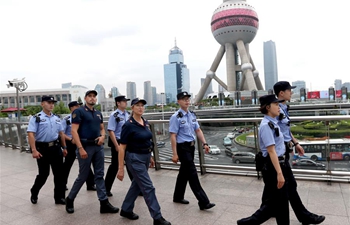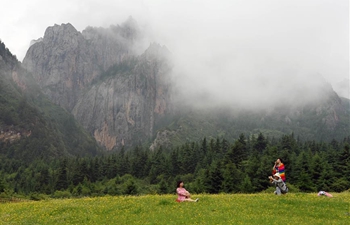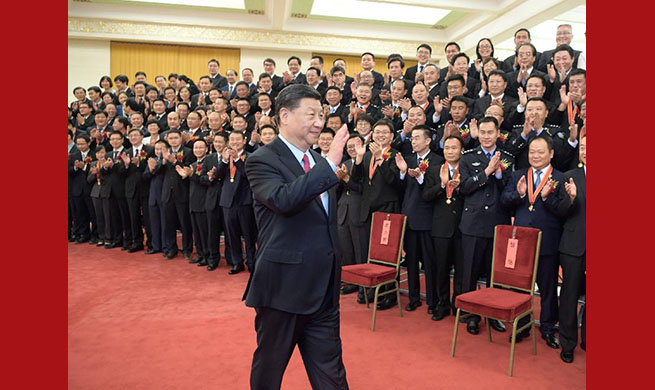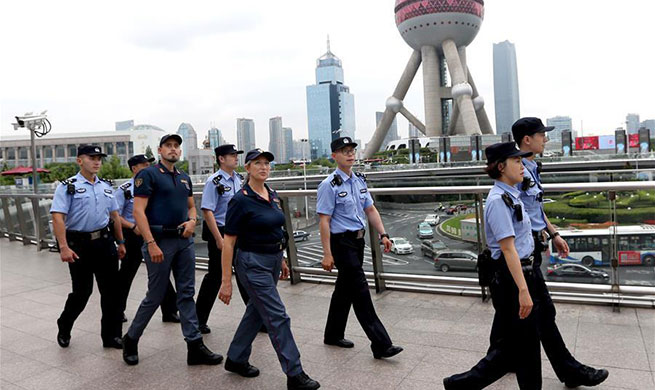GENEVA, June 27 (Xinhua) -- A senior Belarusian diplomat, after his recent trip to China's Xinjiang Uygur Autonomous Region, has expressed his conviction that the vocational education and training centers there have contributed to "regional and global stability" by uprooting terrorists' influence on the young people.
In a recent interview with Xinhua, Vadim Pisarevich, deputy permanent representative of Belarus to the UN Office at Geneva, said he still retains a "very positive image" of the tour to Xinjiang in February with other Geneva-based diplomats.
INSIDE THE CENTERS
The vocational education and training centers in Xinjiang, launched in accordance with relevant laws, aim to help those who are swayed by terrorism and extremism to return to the right track, and help them obtain skills to support themselves and reintegrate into society.
Some Western media and politicians used "camps" to invoke the sorrow memories in history during World War II, and the reason they label the centers in this way is done "for some political ends," said Pisarevich.
In Xinjiang, Pisarevich visited two vocational education and training centers, where he said the students "looked happy and free to move around."
"The students were in the centers because they committed something in their lives, such as minor crimes. But the authorities gave them a second chance," which he said reminded him of French writer Victor Hugo's motto: "He who opens a school door, closes a prison."
"If the centers had not existed, those young culprits would have ended up in prison. I wonder if those in the West who harshly criticize the centers in Xinjiang would be happier for the fate of those young people?" he asked.
In a vocational education and training center in Hotan Prefecture, Pisarevich said, he was impressed by "all modern facilities and skillful teachers that helped students acquire new knowledge and professional skills."
LIFE SKILLS TRAINING
Some western media has repeatedly criticized the centers as a tool for "suppressing ethnic and religious minorities," Pisarevich noted, but he said that from what his group has seen, "the Chinese government very much respected and promoted cultural and religious diversity."
"My argument was that they (the vocational education and training centers) are more than ordinary learning institutions -- I call them LifeSkills Training institutions," said Pisarevich.
"LifeSkills Training institutions are very popular when it comes to fighting drugs and crime," said the official, who has for many years been working and studying crimes and drugs in Austria and his home country Belarus.
"It is a kind of psychological training, to impart critical skills to our children and to students that shape their behavior in a positive way so that they are expected to grow into law-abiding and productive members of their communities and societies," Pisarevich explained.
He said that the concept first emerged in the 1980s due to the works of Dr. Gilbert Botvin, a U.S. expert on prevention and health behavior. Ever since, it has been much developed and increasingly embraced in many parts of the globe.
For Pisarevich, the vocational education and training centers and the LifeSkills Training institutions are similar in three key components, namely, the overall objective, the target group, and the outcomes.
"Both aim to educate young people and impart to them some skills with which they will be able to identify what is right and what is wrong and will, consequently, resist temptation, incitement and encouragement to do something wrong and bad," he said.
He said he is sure that the vocational education and training centers have made their great contributions to the future of Xinjiang, and people will benefit from the security created in the vital corridor there -- the core area of the Belt and Road Initiative, which is good for the Central Asia and for the world at large.
















